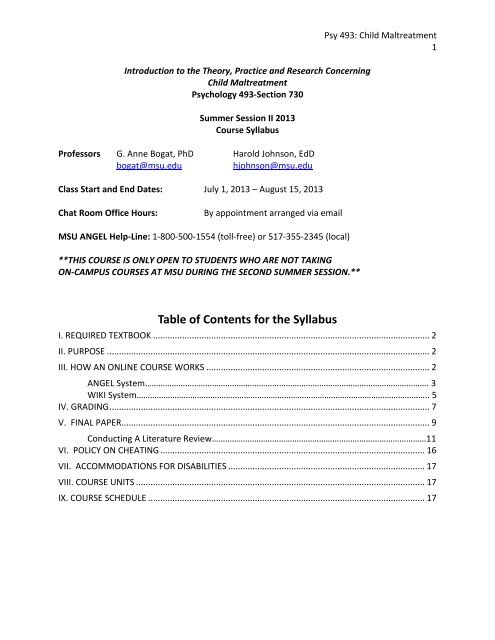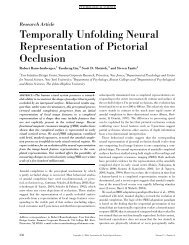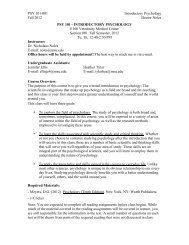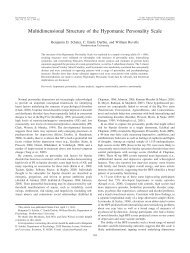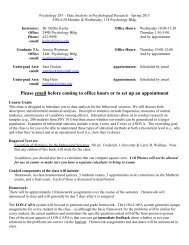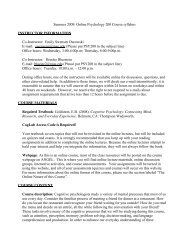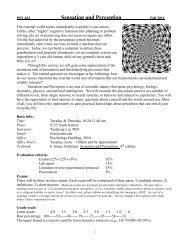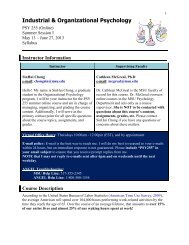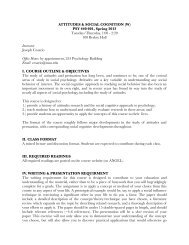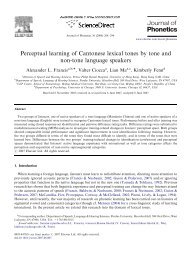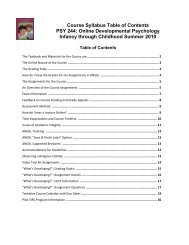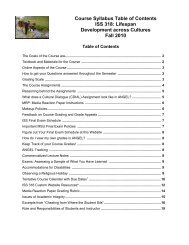Table of Contents for the Syllabus
Table of Contents for the Syllabus
Table of Contents for the Syllabus
Create successful ePaper yourself
Turn your PDF publications into a flip-book with our unique Google optimized e-Paper software.
Introduction to <strong>the</strong> Theory, Practice and Research Concerning<br />
Child Maltreatment<br />
Psychology 493-Section 730<br />
Summer Session II 2013<br />
Course <strong>Syllabus</strong><br />
Pr<strong>of</strong>essors G. Anne Bogat, PhD Harold Johnson, EdD<br />
bogat@msu.edu<br />
hjohnson@msu.edu<br />
Class Start and End Dates: July 1, 2013 – August 15, 2013<br />
Psy 493: Child Maltreatment<br />
1<br />
Chat Room Office Hours:<br />
By appointment arranged via email<br />
MSU ANGEL Help-Line: 1-800-500-1554 (toll-free) or 517-355-2345 (local)<br />
**THIS COURSE IS ONLY OPEN TO STUDENTS WHO ARE NOT TAKING<br />
ON-CAMPUS COURSES AT MSU DURING THE SECOND SUMMER SESSION.**<br />
<strong>Table</strong> <strong>of</strong> <strong>Contents</strong> <strong>for</strong> <strong>the</strong> <strong>Syllabus</strong><br />
I. REQUIRED TEXTBOOK .................................................................................................................. 2<br />
II. PURPOSE ..................................................................................................................................... 2<br />
III. HOW AN ONLINE COURSE WORKS ............................................................................................ 2<br />
ANGEL System………………………………………………………………………………………………………………. 3<br />
WIKI System………………………………………………………………………………………………………………….. 5<br />
IV. GRADING .................................................................................................................................... 7<br />
V. FINAL PAPER............................................................................................................................... 9<br />
Conducting A Literature Review……………………………………………………………………………………11<br />
VI. POLICY ON CHEATING ............................................................................................................. 16<br />
VII. ACCOMMODATIONS FOR DISABILITIES ................................................................................. 17<br />
VIII. COURSE UNITS ....................................................................................................................... 17<br />
IX. COURSE SCHEDULE .................................................................................................................. 17
Psy 493: Child Maltreatment<br />
2<br />
I. REQUIRED TEXTBOOK<br />
Miller-Perrin, C. L., & Perrin, R. D. (2013). Child maltreatment: An introduction. 3 rd Edition.<br />
Sage Publications, Inc: Thousand Oaks, CA.<br />
You may purchase <strong>the</strong> hard copy <strong>of</strong> <strong>the</strong> textbook at <strong>the</strong> bookstores on campus. One option is<br />
<strong>the</strong> Student Bookstore located at 421 E. Grand River Ave East Lansing, MI 48823 Phone: 517-<br />
351-4210 or on-line at http://www.sbsmsu.com/.<br />
II. PURPOSE<br />
This online course focuses on child maltreatment and provides a broad introduction to its<br />
history, <strong>the</strong> legal framework, interventions, and o<strong>the</strong>r pertinent issues (e.g., child advocacy).<br />
Students will become familiar with <strong>the</strong> history <strong>of</strong> <strong>the</strong> field and its legal framework. Theory,<br />
research, and practice regarding child maltreatment, including controversies in <strong>the</strong> field,<br />
empirically-validated treatments, and future directions will be covered. The course will pay<br />
particular attention to children with disabilities as well as issues relevant to <strong>the</strong> State <strong>of</strong><br />
Michigan.<br />
Relevant readings and power point lectures will be available <strong>for</strong> each class session with weekly<br />
tests as well as a midterm exam. The course also includes a unique practicum that allows<br />
students to interface with community pr<strong>of</strong>essionals and colleagues, i.e., “Bright Spots,”across<br />
<strong>the</strong> United States who are active in <strong>the</strong> area <strong>of</strong> child maltreatment. Students will help to ga<strong>the</strong>r<br />
in<strong>for</strong>mation and address problems faced by <strong>the</strong> “Bright Spot” and his/her agency as <strong>the</strong>y deal<br />
with issues <strong>of</strong> child maltreatment. The student team interacts with <strong>the</strong> “Bright Spot” to fully<br />
understand <strong>the</strong> dilemma. Then, <strong>the</strong> team <strong>of</strong> students researches <strong>the</strong> problem and writes a<br />
paper outlining in<strong>for</strong>mation, strategies, and insights based on <strong>the</strong> research conducted. Finally,<br />
<strong>the</strong> team presents its document to <strong>the</strong> “Bright Spot” <strong>for</strong> <strong>the</strong>ir feedback and use. Note:<br />
Instructors will identify <strong>the</strong> ”Bright Spots”; student contact with <strong>the</strong> Bright Spot can occur via<br />
telephone, email, or Skype/ooVoo-type interface. You do not need to be in geographical<br />
proximity to <strong>the</strong> Bright Spot in order to participate in this aspect <strong>of</strong> <strong>the</strong> course.<br />
III. HOW AN ONLINE COURSE WORKS<br />
Some <strong>of</strong> you may be familiar with online courses; <strong>for</strong> o<strong>the</strong>rs <strong>of</strong> you, this might be <strong>the</strong> first<br />
online course you have taken. Please take <strong>the</strong> time to read this section in order to familiarize<br />
yourself with <strong>the</strong> procedures that are followed in online courses. This course will be held<br />
through both <strong>the</strong> ANGEL course management system at MSU as well as a course WIKI<br />
(http://psy-2013.wiki.educ.msu.edu/). The WIKI system may be new to you; o<strong>the</strong>r online<br />
courses may not use it.
Psy 493: Child Maltreatment<br />
3<br />
There will be no physical classes to attend. Since this course is completely online, you need to<br />
make sure that you will have consistent access to <strong>the</strong> Internet throughout <strong>the</strong> course. This<br />
course requires a high speed internet connection. Also, <strong>the</strong> two pr<strong>of</strong>essors interact with <strong>the</strong><br />
students through email and postings on <strong>the</strong> WIKI. We cannot meet with you in person.<br />
All examinations will be given in <strong>the</strong> ANGEL system. All lectures, power points, and class<br />
activities will occur in a WIKI developed <strong>for</strong> this course. Each <strong>of</strong> <strong>the</strong> systems is described below.<br />
Please read carefully.<br />
The ANGEL System<br />
The ANGEL site is: www.angel.msu.edu. In order to login to <strong>the</strong> system you will need your MSU<br />
user name and password. If you do not already have <strong>the</strong>se, please contact <strong>the</strong> MSU Registrar’s<br />
Office (517-432-3952) and one will be assigned to you. If you should encounter ANY technical<br />
difficulties throughout <strong>the</strong> course, contact <strong>the</strong> MSU Helpline by calling<br />
1-800-500-1554 or 517-355-2345.<br />
**IMPORTANT NOTICE**<br />
The following Internet browsers are compatible with ANGEL and have been recommended <strong>for</strong><br />
this course. You are likely to encounter problems during examinations if you do not follow<br />
<strong>the</strong>se recommendations.
Psy 493: Child Maltreatment<br />
4<br />
Browser - OS - Plugin Info<br />
Windows<br />
Internet Explorer 9.x<br />
Firefox 3.6<br />
Firefox<br />
Chrome<br />
Safari<br />
Macintosh<br />
Firefox 3.6<br />
Firefox<br />
Chrome<br />
Safari<br />
UNIX/Linux:<br />
Firefox 3.6<br />
Firefox<br />
*Mobile browsers are not fully supported by ANGEL. Many features such as messaging, drop<br />
boxes, discussion <strong>for</strong>ums, quizzes/exams and o<strong>the</strong>rs will not work correctly. Please use a nonmobile<br />
version <strong>of</strong> Internet Explorer, Firefox, Safari or Chrome.<br />
ANGEL Supported Browsers: Especially Important at Exam Times!<br />
When taking <strong>the</strong> exam it is important to use a Browser that gets along well with ANGEL! Even if<br />
you use (<strong>for</strong> example) Opera <strong>for</strong> much <strong>of</strong> your everyday activity, it may not work in a timed<br />
situation, such as an exam. All <strong>of</strong> <strong>the</strong> recommended browsers are recommended because <strong>the</strong>y<br />
have been tested with ANGEL and are highly compatible with it. In o<strong>the</strong>r words, it is best to play<br />
it safe and use a supported browser.<br />
You can see a list <strong>of</strong> supported browsers by looking at <strong>the</strong> Question Mark over by <strong>the</strong> Guide at<br />
<strong>the</strong> left <strong>of</strong> your course. That is where you find answers to o<strong>the</strong>r Help Questions about ANGEL,<br />
too.<br />
If you are not sure about what browser you are using or don't understand how to get a<br />
specific browser … remember that we have a great Help Desk! Just call 355-2345 or 1-800-<br />
500-1554. They are just as happy to help you prevent a problem as <strong>the</strong>y are to help you in <strong>the</strong><br />
middle <strong>of</strong> one.
Psy 493: Child Maltreatment<br />
5<br />
Firefox is a browser that works very well with ANGEL. Here are <strong>the</strong> download links to get<br />
Firefox.<br />
For Windows:<br />
http://www.mozilla.com/en-US/firefox/personal.html<br />
For Mac:<br />
http://www.apple.com/downloads/macosx/internet_utilities/mozillafirefox.html<br />
Be<strong>for</strong>e you begin an exam:<br />
1. Clear you cache and cookies by going into <strong>the</strong> Tools tab in Firefox.<br />
2. Choose “Clear Private Data” and check two boxes, “Cache” and “Cookies”.<br />
3. Click on “Clear Private Data Now”.<br />
4. Log into ANGEL and begin your exam.<br />
Required Online Orientation inside your ANGEL Course<br />
Every student enrolled in Psychology 493 is required to take <strong>the</strong> ANGEL training course online.<br />
You will find it in <strong>the</strong> “ANGEL Orientation” unit folder. Even if you have taken <strong>the</strong> training<br />
course <strong>for</strong> prior online courses, you are required to take it again <strong>for</strong> this course.<br />
The tutorial explains how to use <strong>the</strong> ANGEL system and what you will need to know in order to<br />
successfully complete <strong>the</strong> course. You must take a short quiz when you have completed <strong>the</strong><br />
tutorial; <strong>the</strong> quiz tests your basic knowledge <strong>of</strong> <strong>the</strong> ANGEL system. You will need to click on <strong>the</strong><br />
Orientation quiz link to access this quiz. Please note: You cannot begin <strong>the</strong> course until you get<br />
90% <strong>of</strong> <strong>the</strong> answers correct. If you do not get a score <strong>of</strong> 90% on your first try, you can keep<br />
taking <strong>the</strong> quiz until you do. However, every time you re-take <strong>the</strong> quiz, you will need to rereview<br />
<strong>the</strong> ANGEL course orientation. Your score on <strong>the</strong> quiz is not included in your grade. We<br />
have you take <strong>the</strong> orientation course and <strong>the</strong> quiz so that you are com<strong>for</strong>table navigating <strong>the</strong><br />
ANGEL system. Learning about ANGEL be<strong>for</strong>e you begin will help avoid later problems.<br />
Student Tracking on Angel<br />
ANGEL tracks all student login in<strong>for</strong>mation. It keeps a record <strong>of</strong> when you log in to ANGEL and<br />
when you log out. It also records when you begin an exam and when you submit it. This helps<br />
us resolve problems that might arise with <strong>the</strong> ANGEL system. You should know, however, that<br />
<strong>the</strong> pr<strong>of</strong>essors cannot view student activity except in <strong>the</strong> course content area. That is, we<br />
cannot view anything you put in <strong>the</strong> “My Content” area.<br />
Course Announcements<br />
All time sensitive assignments will be highlighted in <strong>the</strong> course schedule at <strong>the</strong> end <strong>of</strong> this<br />
syllabus and on <strong>the</strong> course calendar in ANGEL. Reminders <strong>for</strong> examinations and course<br />
assignments will also be posted in ANGEL in <strong>the</strong> course announcement section.<br />
The WIKI System
Psy 493: Child Maltreatment<br />
6<br />
All lectures, power points, and course activities will take place on <strong>the</strong> WIKI system. To access<br />
<strong>the</strong> WIKI <strong>for</strong> this course, go to: http://psy-2013.wiki.educ.msu.edu/. Only students enrolled in <strong>the</strong><br />
course, <strong>the</strong> Instructors and <strong>the</strong> “Bright Spots,” may access this WIKI. You should have received<br />
an invitation to join <strong>the</strong> WIKI via email. Please check your email as this allows you to sign up <strong>for</strong><br />
<strong>the</strong> WIKI. If you did not receive an invitation, please email one <strong>of</strong> <strong>the</strong> instructors as soon as<br />
possible.<br />
In<strong>for</strong>mation concerning <strong>the</strong> use <strong>of</strong> <strong>the</strong> course WIKI can be found via <strong>the</strong> following three<br />
sources:<br />
Video tour<br />
YouTube channel<br />
Wiki Support<br />
Please use <strong>the</strong> “Help” button that can be found in <strong>the</strong> upper right hand corner <strong>of</strong> each wiki page<br />
<strong>for</strong> more in-depth help in<strong>for</strong>mation.<br />
Accessing Lectures and Powerpoints<br />
On <strong>the</strong> right hand side <strong>of</strong> <strong>the</strong> WIKI homepage, you will see individual chapters listed. You can<br />
click on those chapters to access lectures and power points. On <strong>the</strong> Friday be<strong>for</strong>e a specific<br />
week, lectures and powerpoints <strong>for</strong> <strong>the</strong> next week will become available. Once <strong>the</strong>
Psy 493: Child Maltreatment<br />
7<br />
Interacting with <strong>the</strong> Pr<strong>of</strong>essors<br />
Interactions between students and pr<strong>of</strong>essors will be accomplished via <strong>the</strong> “discussion” option<br />
located on each wiki page (see below). The use <strong>of</strong> this option will be noted within <strong>the</strong> context<br />
<strong>of</strong> <strong>the</strong> lecture in<strong>for</strong>mation. This option will not be used within each lecture.<br />
Signing up <strong>for</strong> a Team and Completing Class Project Paper<br />
Each team will be composed <strong>of</strong> three students. Teams and roles within those teams will be<br />
filled on a first-come, first-served basis.<br />
To sign up <strong>for</strong> a team, go to <strong>the</strong> WIKI homepage http://psy-2013.wiki.educ.msu.edu/. On <strong>the</strong> left<br />
side menu, click on “Project.” Click on <strong>the</strong> “Team Page” (top <strong>of</strong> Project main page). You will see<br />
a list <strong>of</strong> 1-10 teams. You can sign up <strong>for</strong> one <strong>of</strong> <strong>the</strong> 3 roles on any <strong>of</strong> <strong>the</strong>se teams—<br />
communicator/organizer, researcher, or writer. To sign up <strong>for</strong> a specific role, click on one <strong>of</strong> <strong>the</strong><br />
ten teams, <strong>the</strong>n click on Edit, and <strong>the</strong>n type your name in <strong>the</strong> role that you want. Once you<br />
have typed your name, you must save <strong>the</strong> page or you have not guaranteed your role.<br />
See “Final Paper” section <strong>of</strong> <strong>the</strong> syllabus, that begins on page 8 below, <strong>for</strong> more explanation<br />
about <strong>the</strong> responsibilities <strong>of</strong> each <strong>of</strong> <strong>the</strong> 3 roles.<br />
Note that once all <strong>the</strong> teams have been filled, Dr. Johnson will assign each team to a Bright<br />
Spot. Students and/or student teams will not be able to choose <strong>the</strong> Bright Spot.<br />
IV. GRADING<br />
Grades will be based on weekly quizzes (multiple choice and/or true-false), a midterm exam<br />
(short answer), and a paper. In<strong>for</strong>mation about each <strong>of</strong> <strong>the</strong>se aspects <strong>of</strong> <strong>the</strong> course is described<br />
below.<br />
Weekly Quizzes<br />
There will be weekly, non-cumulative quizzes. All quizzes are open book and will be timed. All<br />
quizzes will consist <strong>of</strong> 20 multiple choice and/or true-false questions that will include<br />
in<strong>for</strong>mation covered in any material <strong>for</strong> that particular week (e.g., course readings, learning<br />
objectives, outlines, lectures, and power point presentations). Each <strong>of</strong> <strong>the</strong> weekly quizzes will
Psy 493: Child Maltreatment<br />
8<br />
consist <strong>of</strong> 20 multiple choice questions; you will have 30 minutes to complete each quiz<br />
between 9 a.m. – 9 p.m. Eastern Standard Time. ALL QUIZZES WILL BE ON ANGEL.<br />
Midterm Examination<br />
There will also be one midterm examination that will be short answer. Students will be allowed<br />
40 minutes to take this exam. There will be 10 questions that will cover material from <strong>the</strong> first<br />
half <strong>of</strong> <strong>the</strong> class.<br />
The Midterm Examination will be available to take online ON ANGEL on <strong>the</strong> day <strong>of</strong> <strong>the</strong> exam<br />
from 9 a.m. – 9 p.m. Eastern Standard Time.<br />
Please plan carefully. Remember that each quiz and <strong>the</strong> midterm examination begins at 9 a.m.<br />
and closes at 9 p.m. The closing time is very important. You must start <strong>the</strong> quiz or exam so<br />
that you can give yourself sufficient time to complete <strong>the</strong> quiz or exam by 9 p.m. Once time is<br />
up, if you have not already pressed <strong>the</strong> submit button, <strong>the</strong> test will automatically be submitted<br />
<strong>for</strong> you. Once you start a quiz or exam you must complete it; you cannot save it and continue it<br />
at a different time. ANGEL <strong>of</strong>fers this option when you are taking an exam but since <strong>the</strong> time<br />
continues to tick away it is not a useful feature most <strong>of</strong> <strong>the</strong> time. It is useful if <strong>the</strong>re is a problem<br />
with your internet connection and you want to reopen your browser. You also cannot have<br />
ano<strong>the</strong>r browser window open when you are taking <strong>the</strong> quiz or exam. This can lead ANGEL to<br />
skip questions or close your exam.<br />
As noted above, <strong>the</strong>re is a tracking system in ANGEL <strong>for</strong> your protection and ours; it lets us<br />
know when exams were begun and submitted. All discrepancies between <strong>the</strong> student’s report<br />
and <strong>the</strong> ANGEL system will be investigated by <strong>the</strong> pr<strong>of</strong>essor.<br />
If <strong>the</strong>re is a problem during an examination report it as soon as possible to <strong>the</strong> MSU helpline at<br />
1-800-500-1554 or 517-355-2345. They will log <strong>the</strong> problem and, in turn, report it to us. These<br />
technical problems should be reported immediately (maximum within 6 hours). You may also<br />
report <strong>the</strong> problem to us (although we are not available 24/7 like <strong>the</strong> Helpline). If <strong>the</strong>re is a<br />
system problem, it helps us more quickly to discover what went wrong if we hear from several<br />
students. If it is just a problem with your computer, <strong>the</strong>y can help problem solve that issue too.<br />
Because <strong>of</strong> <strong>the</strong> generous amount <strong>of</strong> time allotted <strong>for</strong> students to take each quiz and exam,<br />
<strong>the</strong>re will not be a need to <strong>of</strong>fer make ups. There are only two exceptions to this rule: students<br />
who have a significant illness or who have a serious family problem (e.g., death, funeral).<br />
Students will be required to document <strong>the</strong> veracity <strong>of</strong> <strong>the</strong>se incidents if <strong>the</strong>y request a make-up<br />
quiz or exam. Students who do not provide adequate documentation will receive a grade <strong>of</strong><br />
zero <strong>for</strong> that quiz or exam. Submit <strong>the</strong> documentation by attaching it to an email or by<br />
following <strong>the</strong> procedure below:<br />
1. FAX <strong>the</strong> in<strong>for</strong>mation to: 517-432-2476.<br />
2. Include a cover sheet that says:
Psy 493: Child Maltreatment<br />
9<br />
To: Dr. Bogat<br />
From: [your name]<br />
Subject: Psy 493 Missed Exam Documentation.<br />
3. Then send an email to Dr. Bogat (bogat@msu.edu)<br />
PSY 493: Child Maltreatment Grading Scale<br />
Course Requirements % <strong>of</strong> Total Grade Total Points<br />
Weekly Quiz 1 5% 20<br />
Weekly Quiz 2 5% 20<br />
Weekly Quiz 3 5% 20<br />
Weekly Quiz 4 5% 20<br />
Weekly Quiz 5 5% 20<br />
Midterm Examination 35% 100<br />
Final Paper 40% 100<br />
Possible Total 100% 300<br />
Your final grade will be calculated based upon <strong>the</strong> total number <strong>of</strong> points you have<br />
accumulated across <strong>the</strong> semester.<br />
Points Percent Grade<br />
270-300 90-100% 4.0<br />
255-269 85-89% 3.5<br />
240-254 80-84% 3.0<br />
225-239 75-79% 2.5<br />
210-224 70-74% 2.0<br />
195-209 65-69% 1.5<br />
180-194 60-64% 1.0<br />
< 179 0-59% 0<br />
V. FINAL PAPER<br />
As noted earlier in <strong>the</strong> syllabus, students will help address a specific challenge faced by a Bright<br />
Spot and his/her agency as <strong>the</strong>y deal with issues <strong>of</strong> child maltreatment. Students will <strong>for</strong>m<br />
teams <strong>of</strong> 3 who will interact with <strong>the</strong> pr<strong>of</strong>essional to understand and investigate <strong>the</strong> dilemma.<br />
Then, <strong>the</strong> team <strong>of</strong> students researches <strong>the</strong> problem and writes a paper outlining possible,<br />
existing strategies, additional in<strong>for</strong>mational resources and possible solutions based on <strong>the</strong><br />
research conducted. Finally, <strong>the</strong> team presents its document to <strong>the</strong> pr<strong>of</strong>essional and course<br />
instructors <strong>for</strong> <strong>the</strong>ir use and feedback. Note: Instructors will identify <strong>the</strong> Bright Spot; student<br />
contact with <strong>the</strong> Bright Spot can occur via telephone, email, or Skype/ooVoo-type interface.<br />
You do not need to be in geographical proximity to <strong>the</strong> pr<strong>of</strong>essional.
Psy 493: Child Maltreatment<br />
10<br />
List <strong>of</strong> Bright Spots and Organizations: [see course wiki “Project” section on website http://psy-<br />
2013.wiki.educ.msu.edu/]<br />
Format <strong>for</strong> Final Paper:<br />
A. Name <strong>of</strong> Organization and Bright Spot.<br />
B. Description <strong>of</strong> Mission and Purpose <strong>of</strong> Organization and Role/Responsibility <strong>of</strong> <strong>the</strong> Bright<br />
Spot<br />
C. Statement <strong>of</strong> Challenge and Requested In<strong>for</strong>mation as Identified by Bright Spot<br />
D. Summary <strong>of</strong> Scientific Research Related to Challenge (# C)—a literature review<br />
E. Possible Solutions <strong>for</strong> Organization’s Challenge (# C) Based on Scientific Research Findings<br />
F. Revision <strong>of</strong> Solutions Based on Feedback from Pr<strong>of</strong>essional<br />
G. References used in Paper (use American Psychological Association <strong>for</strong>mat). Must include at<br />
least 10 scientific references<br />
The final paper will be completed via a collaborative group/team process. Each team will be<br />
composed <strong>of</strong> three students.<br />
The roles and responsibilities <strong>of</strong> those individuals are as follows:<br />
1. Communicator/Organizer:<br />
a. The only team member who communicates with assigned Bright Spot and Dr.<br />
Johnson<br />
b. To accomplish “A”, <strong>the</strong> person will ei<strong>the</strong>r use skype/ooVoo, phone calls, or<br />
emails to communicate.<br />
c. Creates log, i.e., date and summarized content <strong>of</strong> all communications with <strong>the</strong><br />
Team's assigned "Bright Spot" and Dr. Johnson. This log must also include<br />
feedback from <strong>the</strong> assigned "Bright Spot" as to <strong>the</strong> usefulness <strong>of</strong> <strong>the</strong> "Final"<br />
Team report. The log is submitted with each version <strong>of</strong> <strong>the</strong> team’s project report.<br />
d. Monitors and encourages Team members as <strong>the</strong>y carry out <strong>the</strong>ir work<br />
e. Assists Team “Researcher” and “Writer”<br />
f. Posts all Team project updates and documents to course WIKI via <strong>the</strong> team’s<br />
page<br />
2. Researcher:<br />
a. Identifies scientific sources <strong>for</strong> requested in<strong>for</strong>mation<br />
b. Evaluates <strong>the</strong> quality <strong>of</strong> <strong>the</strong> scientific in<strong>for</strong>mation<br />
c. Ga<strong>the</strong>rs and shares in<strong>for</strong>mation with <strong>the</strong> Team “Communicators/Organizer” and<br />
“Writer”<br />
3. Writer:<br />
a. Syn<strong>the</strong>sizes in<strong>for</strong>mation provided by <strong>the</strong> Team “Researcher”<br />
b. Writes <strong>the</strong> initial and final drafts <strong>of</strong> <strong>the</strong> Team’s paper
Psy 493: Child Maltreatment<br />
11<br />
c. Assists <strong>the</strong> Team “Researcher”<br />
RESPONSIBILITIES OF ALL TEAM MEMBERS.<br />
1. All members “talk” (via email, skype/ooVoo, telephone, etc.) with <strong>the</strong><br />
Communicator/Organizer about <strong>the</strong> Bright Spot’s requested in<strong>for</strong>mation and help define it so<br />
that <strong>the</strong> Researcher can conduct an adequate literature review. This should be done within <strong>the</strong><br />
first few weeks <strong>of</strong> <strong>the</strong> semester.<br />
2. All members are to read and discuss <strong>the</strong> scientific sources generated by <strong>the</strong> Researcher<br />
Team Member. All members must accept each article <strong>for</strong> use within <strong>the</strong> team’s project report.<br />
3. All members help edit <strong>the</strong> initial and final drafts <strong>of</strong> <strong>the</strong> paper generated by <strong>the</strong> Writer Team<br />
Member.<br />
WHAT MUST BE INCLUDED IN 2 PRELIMINARY DRAFTS (Reports #1 and #2) OF PROJECT PAPER<br />
AND FINAL PAPER<br />
Team report #1 due by 8:00 a.m. (EST) on 7/18/13. Must include:<br />
A. Name <strong>of</strong> Organization and Bright Spot.<br />
B. Description <strong>of</strong> Mission and Purpose <strong>of</strong> Organization and Role/Responsibility <strong>of</strong> <strong>the</strong><br />
Bright Spot within that Organization<br />
C. Statement <strong>of</strong> Challenge and Requested In<strong>for</strong>mation as Identified by Bright Spot<br />
D. The Team "Communicator/Organizer" is to attach to <strong>the</strong> report <strong>the</strong>ir "log," i.e.,<br />
date and summarized content, <strong>of</strong> all communications with <strong>the</strong> Team's assigned<br />
"Bright Spot" and Dr. Johnson.<br />
Team report #2 due by 8:00 a.m. (EST) on 8/1. Must include:<br />
Refinement <strong>of</strong>:<br />
A. Name <strong>of</strong> Organization and Bright Spot.<br />
B. Description <strong>of</strong> Mission and Purpose <strong>of</strong> Organization and Role/Responsibility <strong>of</strong> <strong>the</strong><br />
Bright Spot<br />
C. Statement <strong>of</strong> Challenge and Requested In<strong>for</strong>mation as Identified by Bright Spot<br />
Initial Draft <strong>of</strong>:<br />
D. Summary <strong>of</strong> Scientific Research Related to Challenge (# C)—a literature review<br />
E. Possible Solutions <strong>for</strong> Organization’s Challenge (# C) Based on Scientific Research<br />
Findings<br />
F. Revision <strong>of</strong> Solutions Based on Feedback from Pr<strong>of</strong>essional<br />
G. References used in Paper (use American Psychological Association <strong>for</strong>mat). Must<br />
include at least 10 scientific references.<br />
H. The Team "Communicator/Organizer" is to attach to <strong>the</strong> report <strong>the</strong>ir "log," i.e., date<br />
and summarized content, <strong>of</strong> all communications with <strong>the</strong> Team's assigned<br />
"Bright Spot" and Dr. Johnson.
Psy 493: Child Maltreatment<br />
12<br />
Final Project report due by 8:00 a.m. (EST) on 8/15. Must include:<br />
Final <strong>of</strong> sections A-H above from Team Report #2 as well as<br />
The Team "Communicator/Organizer’s" log must also include feedback from <strong>the</strong> assigned<br />
"Bright Spot" as to <strong>the</strong> usefulness <strong>of</strong> <strong>the</strong> "Final" Team report<br />
Final Paper Projects will be evaluated as follows:<br />
Writing<br />
20% <strong>of</strong> grade<br />
Accuracy <strong>of</strong> In<strong>for</strong>mation 30% <strong>of</strong> grade<br />
And feedback<br />
Depth <strong>of</strong> Understanding 50% <strong>of</strong> grade<br />
*Bonus reports will be awarded based on feedback from <strong>the</strong> Team’s assigned Bright Spot in<br />
relation to <strong>the</strong> timeliness, effectiveness, efficiency, and impact <strong>of</strong> <strong>the</strong> Team’s work<br />
Note: Late report submissions will result in a loss <strong>of</strong> one grade level <strong>for</strong> each day<br />
past <strong>the</strong> due date.<br />
Conducting A Literature Review<br />
Some students may never have conducted a literature review. For good explanations <strong>of</strong> <strong>the</strong><br />
purpose <strong>of</strong> a literature review, we suggest <strong>the</strong> following YouTube videos:<br />
http://www.youtube.com/watchv=2IUZWZX4OGI&feature=related -- Part 1<br />
http://www.youtube.com/watchv=UoYpyY9n9YQ&feature=relmfu -- Part 2<br />
To find your scientific articles, we suggest that you use PsycInfo—this is a database that will<br />
have peer-reviewed published articles or book chapters on <strong>the</strong> topic you are researching.<br />
To access PsychInfo:<br />
1. Go to <strong>the</strong> MSU home page (msu.edu)<br />
2. Put your cursor over <strong>the</strong> ACADEMICS header near <strong>the</strong> top <strong>of</strong> <strong>the</strong> page.<br />
3. Click on “Library”<br />
4. You are now on <strong>the</strong> Library Home Page (http://www.lib.msu.edu/)<br />
5. Put your cursor over <strong>the</strong> “Resources” header at <strong>the</strong> top <strong>of</strong> <strong>the</strong> page.<br />
6. Click on “Indexes & Databases”<br />
7. In <strong>the</strong> box labeled “Indexes Listed Alphabetically by Title” click on <strong>the</strong> letter “P”<br />
8. Scroll down <strong>the</strong> page and click on “PsycINFO including PsycARTICLES”<br />
9. You are now required to login, using your NETID and password.<br />
Once you login, you will see this screen.
Psy 493: Child Maltreatment<br />
13<br />
Let’s say that <strong>the</strong> pr<strong>of</strong>essional your team is working with says <strong>the</strong> challenge she faces is<br />
educating o<strong>the</strong>r pr<strong>of</strong>essionals about how prevalent child abuse is among <strong>the</strong> disabled<br />
population. How do you find articles and books (and book chapters) about this topic In <strong>the</strong><br />
search space you need to think <strong>of</strong> relevant keywords that will help you find resources. You<br />
might type “disabled children and child maltreatment.” If you did, this is <strong>the</strong> screen you would<br />
see.
Psy 493: Child Maltreatment<br />
14<br />
This search term gives you 141 references. That is probably a reasonable number <strong>of</strong> references<br />
to look through (you can scroll down <strong>the</strong> page(s) and read <strong>the</strong> titles <strong>of</strong> <strong>the</strong> books and articles),<br />
but sometimes your keywords result in thousands <strong>of</strong> references. In that case, you probably<br />
need to narrow your search. Regardless, <strong>of</strong> whe<strong>the</strong>r your search was too wide, too narrow, or<br />
just right, you should continue to think <strong>of</strong> different keyword search terms. Do at least 5 or 6<br />
searches. Also, note that you can use <strong>the</strong> “advanced search” tab at <strong>the</strong> top <strong>of</strong> <strong>the</strong> home screen.<br />
This allows you to get very specific searches using authors, keywords, names <strong>of</strong> journals, etc.<br />
For a description <strong>of</strong> how to use keywords to conduct your literature search see:<br />
http://libguides.lib.msu.edu/indexes. There are also YouTube videos that might be helpful.<br />
Let’s return to <strong>the</strong> search. The first reference in <strong>the</strong> above search does not seem related to my<br />
topic. But when I scroll down <strong>the</strong> page, reference #4 seems very relevant.
Psy 493: Child Maltreatment<br />
15<br />
You can see that <strong>the</strong> last line in reference #4 says citation/abstract, link to full text, find<br />
text@MSU. If you want to make sure <strong>the</strong> reference is relevant, you can click on<br />
citation/abstract to read a little bit more about <strong>the</strong> reference. If you <strong>the</strong>n decide it is worth<br />
reading <strong>the</strong> entire reference, you click on “link to full text” and that will usually take you to <strong>the</strong><br />
publisher’s website where <strong>the</strong> article is available. When you “link to full text” in <strong>the</strong> case <strong>of</strong> this<br />
reference, here is what you will find.
Psy 493: Child Maltreatment<br />
16<br />
There is a box on <strong>the</strong> right hand side <strong>of</strong> this page that says “article tools.” If you click on <strong>the</strong><br />
first hotlink (get pdf), you will get a copy <strong>of</strong> <strong>the</strong> article. You can ei<strong>the</strong>r print <strong>the</strong> article or send it<br />
to yourself via email.<br />
This is only a brief introduction to conducting a literature search. If you have more questions,<br />
please email one <strong>of</strong> <strong>the</strong> pr<strong>of</strong>essors or contact <strong>the</strong> library.<br />
Course text, lectures and WIKI “Resources” will serve to assist <strong>the</strong> Team in <strong>the</strong> identification <strong>of</strong><br />
additional pertinent in<strong>for</strong>mational sources.<br />
VI. POLICY ON CHEATING<br />
Students taking this course are expected to adhere to <strong>the</strong> highest ethical conduct. Students<br />
may not assist o<strong>the</strong>r students taking <strong>the</strong> exams, ei<strong>the</strong>r by sitting with <strong>the</strong>m when <strong>the</strong>y take <strong>the</strong>
Psy 493: Child Maltreatment<br />
17<br />
exam or by sending or posting exam answers. Also note that on <strong>the</strong> short answer questions and<br />
on <strong>the</strong> class paper, copying text from an article or book, whe<strong>the</strong>r that was assigned in class or is<br />
found on <strong>the</strong> web, is plagiarism. Anyone caught cheating or plagiarizing will automatically<br />
receive a failing grade <strong>for</strong> <strong>the</strong> course.<br />
We encourage you to visit <strong>the</strong> following website <strong>for</strong> more in<strong>for</strong>mation about what constitutes<br />
academic dishonesty https://www.msu.edu/~ombud/academic-integrity/index.html. Please<br />
look at <strong>the</strong> bar on <strong>the</strong> left side <strong>of</strong> this web page that says Academic Integrity, and read all<br />
sections. You must know what plagiarism is—it will not be tolerated.<br />
VII. ACCOMMODATIONS FOR DISABILITIES<br />
Students with disabilities should contact <strong>the</strong> Resource Center <strong>for</strong> Persons with Disabilities to<br />
establish reasonable accommodations. For an appointment with a counselor, call 517-353-9642<br />
(voice) or 517-355-1293 (TTY). Visit <strong>the</strong> RCPD website at https://www.rcpd.msu.edu/<br />
or send <strong>the</strong>m an email at rcpd@msu.edu.<br />
Also, send Dr. Bogat and Dr. Johnson your VISA document by email on or be<strong>for</strong>e <strong>the</strong> first day <strong>of</strong><br />
class.<br />
VIII. COURSE UNITS<br />
The course is organized into 7 weekly Units.<br />
Readings<br />
All reading assignments come from <strong>the</strong> course textbook. The list <strong>of</strong> which chapters should be<br />
read each week is listed below. In<strong>for</strong>mation in <strong>the</strong> textbook and/or presented within course<br />
lecture or power point will be on <strong>the</strong> quizzes and exam.<br />
Lectures<br />
For each chapter topic, Dr. Johnson and Bogat will provide lecture in<strong>for</strong>mation which includes<br />
one or more power point presentations. In<strong>for</strong>mation from lectures and power points will be on<br />
<strong>the</strong> quizzes and exam.<br />
**OPTIONAL ONLINE UNIT COMPONENTS**<br />
Weblinks<br />
Web links to resources on <strong>the</strong> Web about many lecture topics are provided <strong>for</strong> each unit.<br />
IX. COURSE SCHEDULE
Psy 493: Child Maltreatment<br />
18<br />
WEEK 1: July 1<br />
Chapter 1: HISTORY AND DEFINITIONS OF CHILD MALTREATMENT (Pr<strong>of</strong>essor Johnson)<br />
Chapter 2: THE STUDY OF CHILD MALTREATMENT: THEORETICAL AND METHODOLOGICAL<br />
ISSUES (Pr<strong>of</strong>essor Bogat)<br />
Weekly Quiz: FRIDAY, July 5 from 9 a.m. – 9 p.m.<br />
You will be tested on in<strong>for</strong>mation contained in readings and lectures from Week 1.<br />
WEEK 2: July 8<br />
Chapter 3: CHILD PHYSICAL ABUSE (Pr<strong>of</strong>essor Johnson)<br />
Chapter 4: CHILD SEXUAL ABUSE (Pr<strong>of</strong>essor Bogat)<br />
Weekly Quiz: FRIDAY, July 12 from 9 a.m. – 9 p.m.<br />
You will be tested on in<strong>for</strong>mation contained in readings and lectures from Week 2.<br />
WEEK 3: July 15<br />
Team Report #1 due 8 a.m. EST on 7/18<br />
Chapter 5: CHILD NEGLECT (Pr<strong>of</strong>essor Johnson)<br />
Chapter 6: CHILD PSYCHOLOGICAL MALTREATMENT (Pr<strong>of</strong>essor Bogat)<br />
Weekly Quiz: FRIDAY, July 19 from 9 a.m. – 9 p.m.<br />
You will be tested on in<strong>for</strong>mation contained in readings and lectures from Week 3.<br />
WEEK 4: July 22<br />
Midterm Quiz: FRIDAY, July 26 from 9 a.m. – 9 p.m.<br />
You will be tested on in<strong>for</strong>mation contained in readings and lectures from Weeks 1, 2, and 3.<br />
WEEK 5: July 29<br />
Team Report #2 due 8 a.m. EST on 8/1.<br />
Chapter 7: ADDITIONAL FORMS OF CHILD MALTREATMENT (Pr<strong>of</strong>essor Bogat)<br />
Chapter 8: KEY ISSUES IN RESPONDING TO CHILD MALTREATMENT (Pr<strong>of</strong>essor Johnson)<br />
Weekly Quiz: FRIDAY, August 2 from 9 a.m. – 9 p.m.<br />
You will be tested on in<strong>for</strong>mation contained in readings and lectures from Week 5.<br />
WEEK 6: August 5<br />
Chapter 9: CONTROVERSIAL ISSUES IN THE STUDY OF CHILD MALTREATMENT (Pr<strong>of</strong>essor Bogat)<br />
Chapter 10: WHAT YOU CAN DO TO HELP (Pr<strong>of</strong>essor Johnson)<br />
Weekly Quiz: FRIDAY, August 9 from 9 a.m. – 9 p.m.
Psy 493: Child Maltreatment<br />
19<br />
You will be tested on in<strong>for</strong>mation contained in readings and lectures from Week 6.<br />
WEEK 7: AUGUST 12<br />
Final Project Paper due 8 a.m. EST on 8/15<br />
*This syllabus is subject to modification. Any modification will be posted to <strong>the</strong> course web site<br />
at least one week prior to implementation. It is <strong>the</strong> responsibility <strong>of</strong> <strong>the</strong> student to regularly<br />
check <strong>the</strong> course web site <strong>for</strong> additional materials and course updates.<br />
Keep <strong>the</strong> ANGEL help numbers by your computer in case <strong>the</strong>re is a problem. Print<br />
a copy <strong>of</strong> this syllabus so that you have this in<strong>for</strong>mation handy in case <strong>the</strong>re are<br />
problems with accessing ANGEL.


